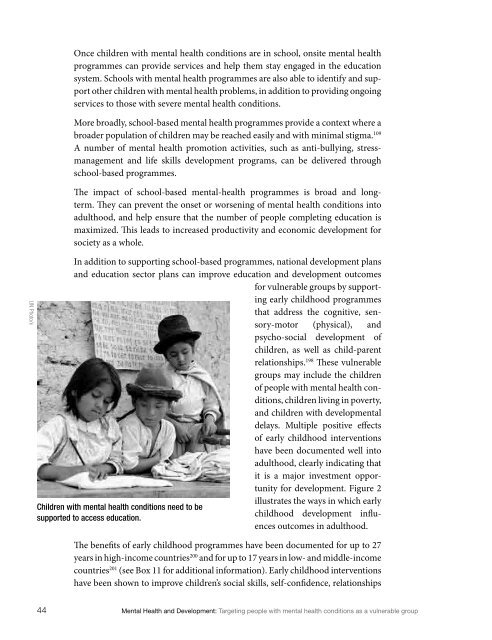MENTAL HEALTH AND DEVELOPMENT: - libdoc.who.int - World ...
MENTAL HEALTH AND DEVELOPMENT: - libdoc.who.int - World ...
MENTAL HEALTH AND DEVELOPMENT: - libdoc.who.int - World ...
You also want an ePaper? Increase the reach of your titles
YUMPU automatically turns print PDFs into web optimized ePapers that Google loves.
UN Photo/x<br />
Once children with mental health conditions are in school, onsite mental health<br />
programmes can provide services and help them stay engaged in the education<br />
system. Schools with mental health programmes are also able to identify and support<br />
other children with mental health problems, in addition to providing ongoing<br />
services to those with severe mental health conditions.<br />
More broadly, school-based mental health programmes provide a context where a<br />
broader population of children may be reached easily and with minimal stigma. 109<br />
A number of mental health promotion activities, such as anti-bullying, stressmanagement<br />
and life skills development programs, can be delivered through<br />
school-based programmes.<br />
The impact of school-based mental-health programmes is broad and longterm.<br />
They can prevent the onset or worsening of mental health conditions <strong>int</strong>o<br />
adulthood, and help ensure that the number of people completing education is<br />
maximized. This leads to increased productivity and economic development for<br />
society as a <strong>who</strong>le.<br />
In addition to supporting school-based programmes, national development plans<br />
and education sector plans can improve education and development outcomes<br />
for vulnerable groups by supporting<br />
early childhood programmes<br />
that address the cognitive, sensory-motor<br />
(physical), and<br />
psycho-social development of<br />
children, as well as child-parent<br />
relationships. 198 These vulnerable<br />
groups may include the children<br />
of people with mental health conditions,<br />
children living in poverty,<br />
and children with developmental<br />
delays. Multiple positive effects<br />
of early childhood <strong>int</strong>erventions<br />
have been documented well <strong>int</strong>o<br />
adulthood, clearly indicating that<br />
it is a major investment opportunity<br />
for development. Figure 2<br />
Children with mental health conditions need to be<br />
supported to access education.<br />
illustrates the ways in which early<br />
childhood development influences<br />
outcomes in adulthood.<br />
The benefits of early childhood programmes have been documented for up to 27<br />
years in high-income countries 200 and for up to 17 years in low- and middle-income<br />
countries 201 (see Box 11 for additional information). Early childhood <strong>int</strong>erventions<br />
have been shown to improve children’s social skills, self-confidence, relationships<br />
44 MentalHealthandDevelopment:Targetingpeoplewithmentalhealthconditionsasavulnerablegroup

















